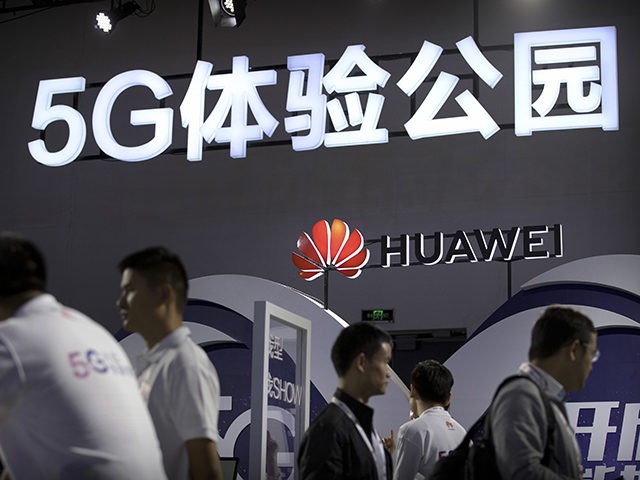Senator Marco Rubio (R-FL) on Tuesday warned that Chinese surveillance technology, particularly facial recognition systems, is appearing in cities around the world and poses a serious threat to Americans traveling abroad.
Rubio told the Washington Examiner that China’s facial recognition system “improves targeting,” which could “imperil Americans traveling abroad, including those who are involved in the business sector, not just those involved in intelligence and diplomacy.”
“At its most basic level, the more you know about someone, the easier it is for you to target, leverage them, or use their information to make predictive decisions about it,” he said.
Rubio said the dangers of Chinese surveillance technology spreading around the world were highlighted when he visited Kenya and found Chinese-made robot cameras snapping pictures at nearly every intersection.
“Now they would argue that all that information is held by the Kenyans, ‘We’re just buying a product off the shelf from a company that happens to be from China.’ But the reality is that in order for that system to work and for them to design the software for it, they had to have access to government databases,” he said.
Rubio warned the enormous amount of data flowing from Chinese corporations to Chinese intelligence services will allow their artificial intelligence systems to become adept at predicting the actions of foreigners and making inferences about the corporations or government agencies they work for.
“Now you’re able to overlay your ability to hack into their computers and access their databases with knowing where they are in real time, who they’re meeting with, and get information from them that way. They know what hotel you’re staying in, they know what WiFi network you’re on. It provides them more and more opportunity for that company and that government to access your corporate information and steal it,” he explained.
Rubio wrote a letter with fellow Senate Intelligence Committee member Ron Wyden (D-OR) asking the U.S. State Department to issue a travel warning for every one of the 18 countries known to use Chinese surveillance technology but has not yet received a response.
The list of countries was derived from an April 2019 New York Times article. Rubio and Wyden noted the countries include “Germany, which has strong privacy and human rights protections, but also Pakistan and the United Arab Emirates, which do not.” The senators cited a warning from Freedom House that authoritarian nations are likely to make data gathered with Chinese technology available to Chinese intelligence agencies “through both legal and extralegal methods.”
One of the countries profiled by the New York Times was Ecuador, which now has 3,000 government employees monitoring data collected by some 4,300 cameras and passing the intel along to Ecuador’s ugly internal intelligence agency, SENAIN, which has a history of repressing journalism and political dissent. Huawei was one of the two main providers for Ecuador’s system, which dates back to 2011 and is correspondingly less chillingly efficient than the top-shelf panopticon technology China is selling to authoritarian governments today.
According to the NYT, China’s surveillance tech packages frequently include training in how to use the equipment for “public opinion guidance” – in other words, censorship, propaganda, and political control.
Ecuador’s system uses a good deal of manual labor per surveillance camera, but current and next-generation surveillance relies on A.I. technology to exponentially multiply the efficiency of each human overseer. This makes entirely new levels of surveillance and intelligence work possible. There is no way any human intelligence agency staff could listen to everyone’s cell phone conversations or monitor millions of camera feeds, but A.I. systems can do it.
One of the great concerns among Western analysts is that China’s surveillance state is accumulating gigantic amounts of information that can be used to improve its A.I. systems, while other nations with more stringent ethical guidelines and more concern for individual privacy fall behind.
Rubio and Wyden warned China is using companies like Huawei to “spread its authoritarian model abroad and influence foreign countries.”Americans need to know that repressive regimes may use Chinese-made technology to gain access to sensitive data – or that Chinese intelligence may gain access to data, even if Americans never set foot in China,” they told the State Department.
Some of that political and ideological influence comes through the teams of Chinese engineers that set up shop in each country that buys surveillance technology. Cameroon, for example, just opened its new Huawei-built “national command center” this week, spreading 1,500 cameras through a dozen cities with more to come. A source within Cameroon’s state telecom company, Camtel, said the Chinese are “reluctant to transfer technology to local staff because they want to remain here.” Cameroonian tech workers voiced suspicions that Huawei deliberately kept them in the dark during the installation process so it could retain control of the network.
The Wall Street Journal reported in August that Huawei technicians are becoming embedded with the security services of Algeria, Uganda, and Zambia and helping them repress political opposition by tracking the activities of dissident politicians and intercepting their communications. The report was disputed by Huawei and local officials.

COMMENTS
Please let us know if you're having issues with commenting.